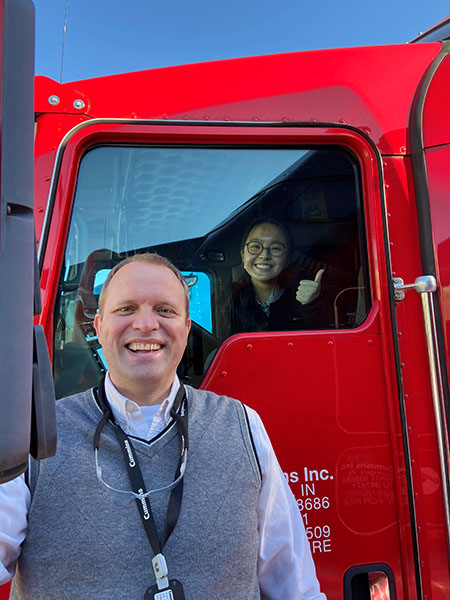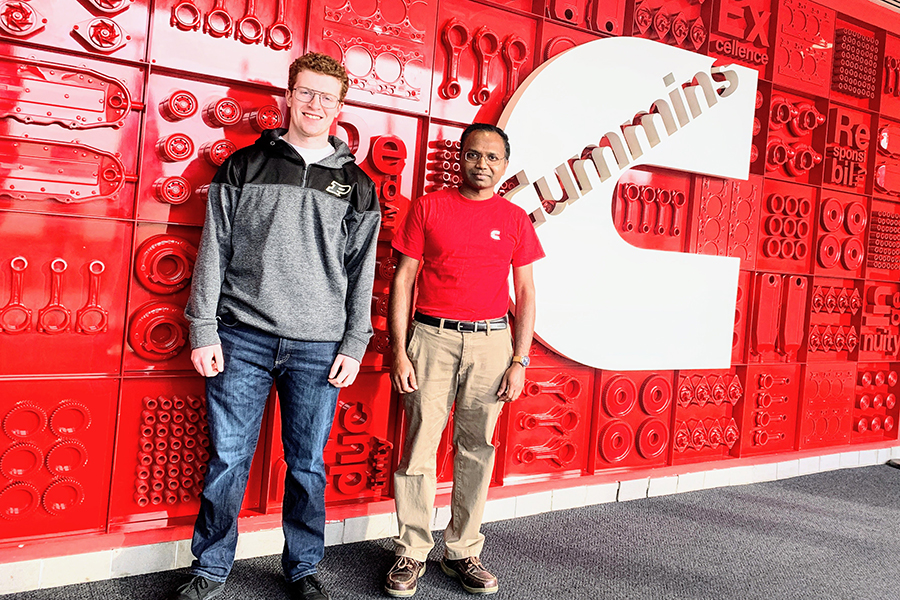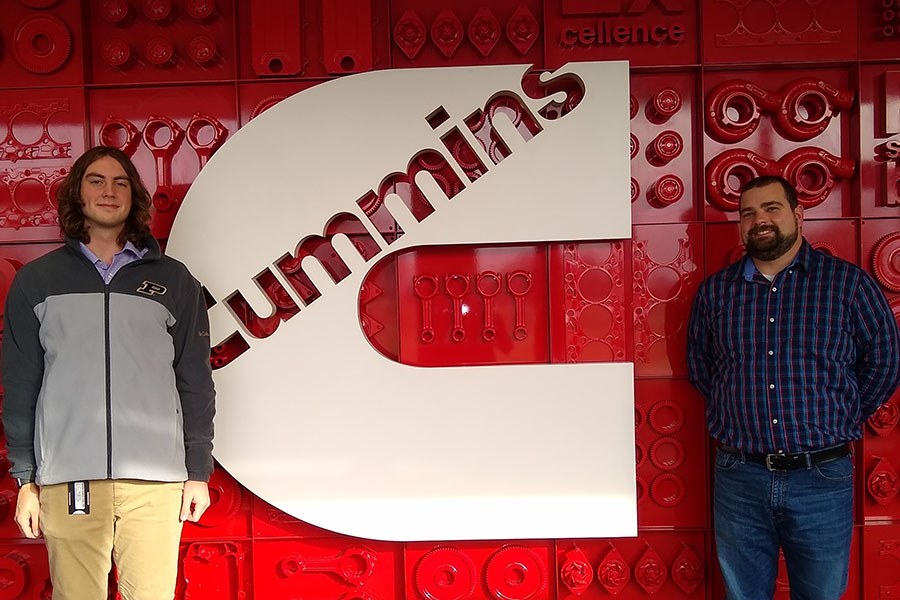Learning While Working co-op provides continuous industry-campus experience

An advancement of the co-op model, Learning While Working (LWW) provides an opportunity for students to work continuously for one year “to gain a greater depth of experience and really become part of an organization,” said Francisco Montalvo, assistant director of Global Projects in Purdue's Office of Professional Practice (OPP).
Students collaborate on engineering projects with companies, resulting in greater mentorship from supervisors and advanced technical training from Purdue University faculty.
“This combination of perspectives will significantly enhance the quality of engineer produced by Purdue and our industry partners,” Montalvo said.
The LWW model was developed to provide students with a year-long continuous experience rather than a rotational co-op, allowing for fully integrated learning with high-level training and broader responsibility for students.
“The global pandemic has accelerated the adoption of online education. It enables college students gaining working experience through co-op and internships while making substantial academic progress to avoid significant delay in graduation. For instance, at Purdue University, 671 students have taken 1,744 online courses (more than 3,400 credit hours) while conducting their co-ops and internships during 2021-2022," said Luna Lu, OPP's director.
"To take full advantage of this opportunity (or to adapt to the new learning opportunity), Purdue College of Engineering has invented this new experiential learning program known as Learning While Working (LWW). Compared to traditional programs, LWW offers more flexibility with a holistic experiential learning experience to students. It is particularly beneficial to those from low-income families and underrepresented groups,” Lu said.
OPP works with new employers that don't typically do a rotational co-op; in some of these formats, employers are interested in hiring students for continuous work. The intent is to build more courses online so students can earn credit while completing a LWW session.
“We are excited to offer this new version of co-op,” said Joe Tort, associate director of the OPP. “We believe the technical and professional skills students will gain via a full-year of work, and engagement in real-life engineering projects mentored by the company and Purdue faculty, will make this the Honors of work-integrated learning. We can’t wait to see the impact our students will make for their companies and the success they will have post-graduation.”
During the LWW pilot study in 2021, six postings with Cummins were filled with a diverse group of students from the College of Engineering. Since then, six new year-long co-op postings have been added with 34 students currently working under this modality. In addition, five new companies joined in 2022 — Tesla, Evonik, ZF, AWS and Radian Technologies.

LWW students earn a co-op certificate after fulfilling their 12-month commitment. The intent is to develop academic courses for students to take online while participating in a co-op experience to reduce the time to graduation from 5 years to 4.5 or 4 years. OPP is building partnerships with co-op employers to hire cohorts of students, and while working, students take a 3-credit course online during each of the academic periods for which the student is registered for co-op.
Students complete for-credit engineering projects that are integrated into the work experience. These projects incorporate company mentors as well as a Purdue faculty mentor. From the faculty perspective, the projects are well-aligned with their research interests, and this new initiative opens possibilities of collaboration with key stakeholders in industry.
“This co-op model is different, as students have options to make significant progress toward their degree through industry-based projects for credit and the option to enroll in certain online classes. Employers understand that with the option to have students for a full year, it is important to remain connected to campus through faculty mentorship,” Montalvo said.
Greg Shaver, professor of mechanical engineering, helps to guide the project aspect of the program. Currently, he is the faculty mentor for Evan Hill, a junior in electrical and computer engineering.
“Together with his Cummins mentor, Shravan Vudumu, we are guiding Evan’s work focused on the calibration of advanced control systems for future generations of Cummins high efficiency, low NOx IC engines for commercial vehicles,” Shaver said. “I meet every other week with Evan and Shravan to discuss Evan’s progress and provide suggestions for next steps.”
LWW supports industry demand for unique talent by developing pipelines through this extensive and engaging work experience, Montalvo said. “One of the best aspects of this model is the ability to stay connected with mentors and build relationships and outcomes that students can truly lean on for future employment.”

Nick Mori is an industrial engineering senior from Rockville, Md., working at TESLA through the GEARE program. When asked to compare a one-year work experience to a shorter-term summer internship, he said more time spent with an employer is beneficial.
“You gain invaluable time to be trained, integrated into the team, learn the products, and have an opportunity to see out entire projects from conception to production. You can truly become an expert in one area and contribute positively to the team,” he said.
Plus, the rewards are far reaching, he added. “Most longer-term work experiences are converted into a full-time position or offer. I personally feel that upon graduation, I will be able to attain a better salary and position at a company or team I previously could only have dreamed about.”
Jiyoon Im, a mechanical engineering junior from Busan, South Korea, began her LWW co-op at Cummins in the spring 2022 semester and already has experienced a wealth of learning and personal development opportunities that she will use during the remainder of her academic career and beyond. She particularly enjoys the “Tech Topic” part of each meeting in which a member presents about current work and projects.
“Everyone comes together with critical thinking and problem-solving skills, bouncing ideas off each other to tackle the problem to make the product more efficient, sustainable and cost effective.”
Maxwell Bolt, a junior in mechanical engineering from Clarks Hill, Ind., also is completing a LWW experience at Cummins and says the experience is packed with new challenges every day.
“Personal growth does not happen alone at Cummins,” he said. “Everyone I meet is willing to slow down to show me their work and answer questions so I can better understand how my cog fits into the machine. The range of learning opportunities has been illuminating. Just today, I spoke with an engineer about his cutting-edge machine learning algorithm and helped a technician install sensors that feed that algorithm.”

While continuing to build the infrastructure, OPP will work with academic units to offer courses online that will be meaningful to the student's plan of study, as well as for their work within the company.
“Cummins is excited to participate in the Purdue Learning While Working co-op pilot project,” said Steven E. Ferdon, director of Global Engineering Technology for Cummins Electronics & Fuel Systems Business. “When fully developed, this new co-op format will be a ‘win’ for all participants. For the employer, a 12-month co-op is an opportunity to complete broader and deeper technology projects than what can be accomplished in a traditional summer internship. For the Purdue academic advisor, it is an opportunity to work on practical real-world problems, while building a collaborative relationship for future industry funded research. Most importantly, for the student, it is an opportunity to stay on schedule for graduation, earn significant income to offset tuition costs and strengthen their resume with extended industrial work experience.”
Cummins has been pleased with the new LWW format so far and foresees lasting benefits for students, faculty and industry alike.
For more information about LWW, contact Assistant Director of Global Projects Francisco Montalvo or Director of Office of Professional Practice, Luna Lu.
